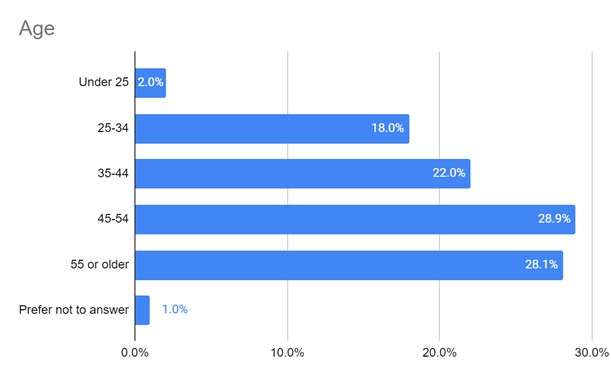Vivian strives to empower nurses and other healthcare professionals (HCPs) to get the jobs they desire by listening to what they want most from employers. To help us do this, we complete an annual survey to learn from healthcare professionals working in various fields and discover what they look for in a job and an employer. We also learned more about their overall attitudes toward their careers.
This year marks the third survey we’ve conducted. If you’re curious about what we learned and whether it resonates with what you long for in your healthcare career, here are some highlights covering a few common themes among our respondents, as compiled in The Future of Healthcare Work Report 2023.
Get to Know the Respondents

We surveyed more than 1,600 participants. Although they were kept anonymous, we collected specific demographics to demonstrate the variety of clinicians within the pool. To better understand who responded, the following offers a brief background on our participants.
While most were current Vivian Health users responding via email, we also sourced respondents through social media, such as Facebook groups for nurses and organic Instagram posts. Responses came from healthcare professionals across various ages, disciplines, career experience and work settings.
Age Groups
Our youngest and smallest group of respondents were under the age of 25, which represented about 2% of the pool. Conversely, respondents between the ages of 45 and 54 were our largest group of respondents, representing nearly 29% of the pool, followed closely by those aged 55 or older, with about 28% of the pool in this group. Other groups represented were 22% aged 35 to 44 and 18% aged 25 to 34.

Healthcare Disciplines
Respondents were primarily registered nurses, but we saw a growing number of allied health professionals participating in this year’s survey. A small percentage of licensed practical/vocational nurses, 6%, and certified nursing assistants, 4.8%, also took part in the 2023 survey. The exact breakdown was as follows:
- RN: 65.2%
- Allied Health: 17.3%
- LPN/LVN: 6%
- CNA: 4.8%
- Therapy: 2.7%
- Nurse Practitioner: 1%
- CMA: 0.7%
- Non-Healthcare: 0.2%
- Advanced Practice: 0.1%
- Faculty: 0.1%
- Other: 0.4%
Years of Experience
Like ages, time on the job also ran the gamut, with our respondents having a broad range of experience. A small portion had fewer than 2 years of experience, while a large number had 3 to 10 years or 11 to 24 years of experience. A relatively significant percentage of respondents had 25-plus years of experience in their healthcare careers.

Employment Type and Practice Setting
Based on employment type, 80% of respondents were actively employed full-time, with 44% as permanent staff members and 36% as travel or short-term contract employees. Almost 18% of the remaining participants were also actively employed, with 11.5% working per diem roles and 6.4% part-time staff members. Another 6.6% weren’t actively employed, and 1.2% were retired. Work settings of those actively employed varied and included the following:
- Mid-Sized Acute Care Hospitals with 100-500 Beds: 31.3%
- Larger Acute Care Hospitals with More Than 500 Beds: 24.4%
- Small Acute Care Hospitals with Less Than 100 beds: 9.7%
- Long-Term Care Facilities: 8.3%
- Primary, Ambulatory or Outpatient Care Facilities: 7.7%
- Community or Public Health Facilities: 3.7%
- Long-Term Acute Care Facilities: 2%
- Virtual Care Roles: 1.6%
- Correctional Facilities: 1.1%
- Other: 10.3%
What Fellow HCPs Seek Most in New Jobs

Whether the respondent worked in a permanent or travel role, a bulk of them agreed that the factor they considered most when seeking a new job was salary. However, survey participants could choose up to five things most important to them in their job search, so hourly wages weren’t the only thing that scored high. The top five factors with the highest rank included:
- Hourly Wage: 89.40%
- Benefits: 57.17%
- Staff to Patient Ratios: 52.65%
- Commute Time: 50.33%
- Flexible Shifts: 48.23%
Several other factors also made the list. Although these factors earned lower scores, fellow healthcare professionals still felt the following should play an important role when you’re considering a new job offer:
- Facility Reputation: 24.83%
- Career Advancement Opportunities: 23.07%
- Professional Challenge: 19.54%
- New Geographic Location: 16.78%
- Mental Health and Well-Being Programs: 12.91%
- Listening to Clinician Input: 10.15%
- Playing a Role in Regional Staff Shortages: 8.61%
- Continuing Education: 8.17%
- Tuition Reimbursement: 7.73%
- Nursing Shared Governance: 3.20%
Most Desired Benefits
Your fellow healthcare professionals also ranked which benefits were most important to them. Responses firmly include healthcare benefits, with three-fourths of participants ranking it as a highly valued benefit. Since they could choose more than one benefit they most wanted, other benefits also received significant scores. The following includes the top 10 most attractive benefits to our 2023 respondents:
- Healthcare (Medical/Dental): 75.83%
- Retirement Benefits/Pension: 65.48%
- Vesting Length for 401K: 36.26%
- Short-Term and Long-Term Disability: 19.60%
- Tuition Reimbursement: 13.59%
- Continuing Education: 13.05%
- Life Insurance: 11.73%
- Gym/Well-Being Programs: 8.42%
- Childcare and/or Dependent Care: 4.75%
- Financial Counseling: 3.55%
Fewer Professionals Intend to Leave the Field
Now in the third year of this survey, trends have begun to emerge. Many healthcare professionals who’ve worked on the front line since the COVID-19 pandemic began in 2020 felt more stress than ever.
As proof, the number of healthcare professionals thinking about leaving the profession jumped significantly between the 2021 and 2022 surveys. While 43% of the 2021 respondents said they were considering leaving the healthcare field, 63% of 2022 respondents said they were considering leaving healthcare in the next five years.
However, according to our 2023 Future of the Healthcare Work Report, a few healthcare workers are feeling more satisfied within the field. The percentage of those who said they had no plans of leaving healthcare within the next three years increased to 54.36% from 2022’s rate of 47%.
Conversely, 45.64% of 2023 respondents indicated they intended to leave the field sometime between the next 6 months and the next 2 to 3 years. The actual breakdown appears in the table below.
| Percentage | Timeframe they intend to leave healthcare |
| 7.40% | Within the next 6 months |
| 7.04% | Within the next 6 to 12 months |
| 12.15% | Within the next 1 to 2 years |
| 19.06% | Within the next 2 to 3 years |
It’s important to note that measuring the intent of healthcare professionals to leave their jobs is different from who actually decides to exit the medical profession. The intent to leave may stem from various stressors that cause them to think about what it might be like to change careers.
Stress Factors HCPs Faced in 2022

Healthy work environments have become increasingly important to nurses and other healthcare professionals. Personal safety, employer support for their mental health and well-being and receiving adequate time off to help prevent burnout and enhance work/life balance are some of the critical things HCPs need in their workplaces. Without it, their desire to change professions could become a dominant theme in their minds.
For example, more than half the respondents in the 2023 survey said they were asked daily or weekly to work overtime. Furthermore, half of the staff clinicians surveyed took only one to two weeks of paid time off (PTO) in 2022. Heavy workloads with excessive overtime, inadequate rest between shifts, too many consecutive shifts and the inability to take PTO all contribute to the stress and fatigue felt by healthcare workers.
Added to this mix are unsafe work environments, with some respondents voicing their concerns over high nurse-to-patient ratios that impacted their ability to provide adequate patient care. These and other factors impact work/life balance and may result in burnout.
Vivian Health takes great strides to empower healthcare professionals nationwide to find jobs they enjoy and feel passionate about. Simultaneously, we strive to assist healthcare facilities with hiring by helping them understand what healthcare professionals want most in their next job. Sharing this information with employers presents a win for both sides, as facilities learn actionable insights on what healthcare professionals need most to feel valued in their workplaces.
If you’re curious about what else fellow nurses and healthcare professionals had to say, request the full version of The Future of Healthcare Work Report 2023.
What’s most important to you, and how are you feeling about your current and future employment in the medical field? Share your thoughts below in the comments section.









